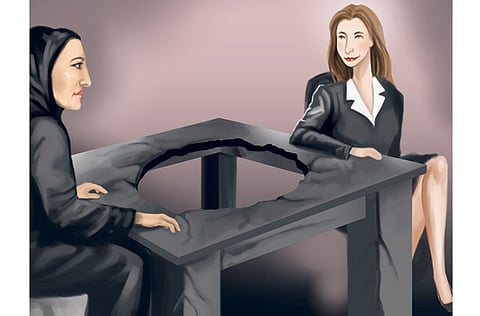Find political solution to West's problem with Islam
Leaders should build on high respect for Western countries in Muslim areas

Leaders in the Muslim world and the West should focus on finding political solutions, and avoid nurturing religious differences
Tensions between Islam and the West are manageable if leaders were to focus more on finding political answers, and less on religious differences. The West should also focus on policies that are seen as fair to both Muslims and the West, which would allow political leaders to build on the continuingly high respect for the West in Muslim areas.
These interesting findings were part of an important poll of opinion in Muslim majority states and Western countries carried out by Gallup and published in a report called "Measuring the state of Muslim-West relations", which was announced last week when the new Abu Dhabi Gallup centre was officially opened.
It was startling that respect in the Muslim world for the West was very high in the Arab world, and had also increased from 2008 to 2009, despite all the woes in Iraq and Afghanistan, and the perennial hatred generated by American support for Israel.
A surprisingly high 64 per cent of the Arab population respected the West in 2008, which grew to 71 per cent in 2009. While the shift may be attributed to Obama's Cairo speech, it is nonetheless a very high rating from which to start with, and encouraging for those seeking better relations.
But very dangerously, this sense of respect for the West is not seen by Muslims in the Middle East to be reciprocated. A miserable 17 per cent of the population of the Middle East region in 2008 thought the Western world respected the Muslim world, and although this impression got slightly better in 2009, it only reached 26 per cent. This means that despite the very high respect recorded for the West in Arab countries, an overwhelming majority of Arabs do not feel that their states are respected in the same way by the populations in the West. This wide gap is bound to create serious resentment, which can manifest itself in many ways including frustration and anger at the West for not being more open to its would-be friends, which in a small minority of cases can turn to more radical anger.
Hopeful trend
However, Gallup found that the majority in all countries, whether Western or Muslim, thought that Muslim-Western conflict could be avoided. This hopeful trend was most pronounced in Europe, where 69 per cent of the population thought that conflict could be avoided and only 21 per cent thought it inevitable, compared to 55 per cent in the Middle East who thought conflict avoidable, and 31 per cent who thought it inevitable.
The region with the most depressing outlook was the US and Canada, where a very high 45 per cent of the population thought conflict inevitable, and an unusually low one per cent did not know what to think. This very high expectation of Muslim-Western conflict, and alarming certainty of view, puts the US at odds with the rest of the world. Only 54 per cent of US and Canadian population thought that conflict could be avoided, whereas in other regions a much larger percentage of people are willing to look for co-existence and peaceful solutions.
The way forward depends on what the root causes of the clash are. If they are religious, political or cultural makes a very important difference. If people see the root causes as political, then Gallup found that they are more willing to find solutions. After all, politics is art of compromise and all politicians have to manage their societies and get along with all sorts of people. However, if the root cause of the clash is seen as religious, then a much more gloomy view prevails, in which conflict is seen as more inevitable.
In the US and Canada 35 per cent thought that the clash was based on religion, and 36 per cent on politics, while a further 26 per cent thought that it was cultural. In the Middle East, a similar dichotomy prevailed with 40 per cent seeing the clash as religious, and another 40 per cent as political, and only nine per cent as cultural. This split in both regions gives an important opportunity for leaders to exploit, as those who wish to seek solutions to the clash should focus more on the political causes, where answers can be found.
Conversely of course, it gives an opportunity to those who wish to exploit the clash to focus more on the religious differences, and so encourage the split between Muslim states and the West.
When comparing religion, politics and culture, Gallup was clear that religion is the most meaningful emotional trigger. A very high 72 per cent of Muslims said that stopping desecrating religious symbols was very meaningful, compared to 54 per cent who thought that treating Muslims fairly in politics was very meaningful, and 49 per cent who thought that portraying Muslims accurately in films would be very meaningful.
But the picture of how religion plays out in defining readiness to engage and seek solutions to the possible conflict is complicated. It was fascinating that Gallup found that of all the Muslims ready to engage with the West, 72 per cent had been to a place of worship the last seven days, whereas from those Muslims not ready to engage with the West, 60 per cent had been to a place of worship in the past seven days.



